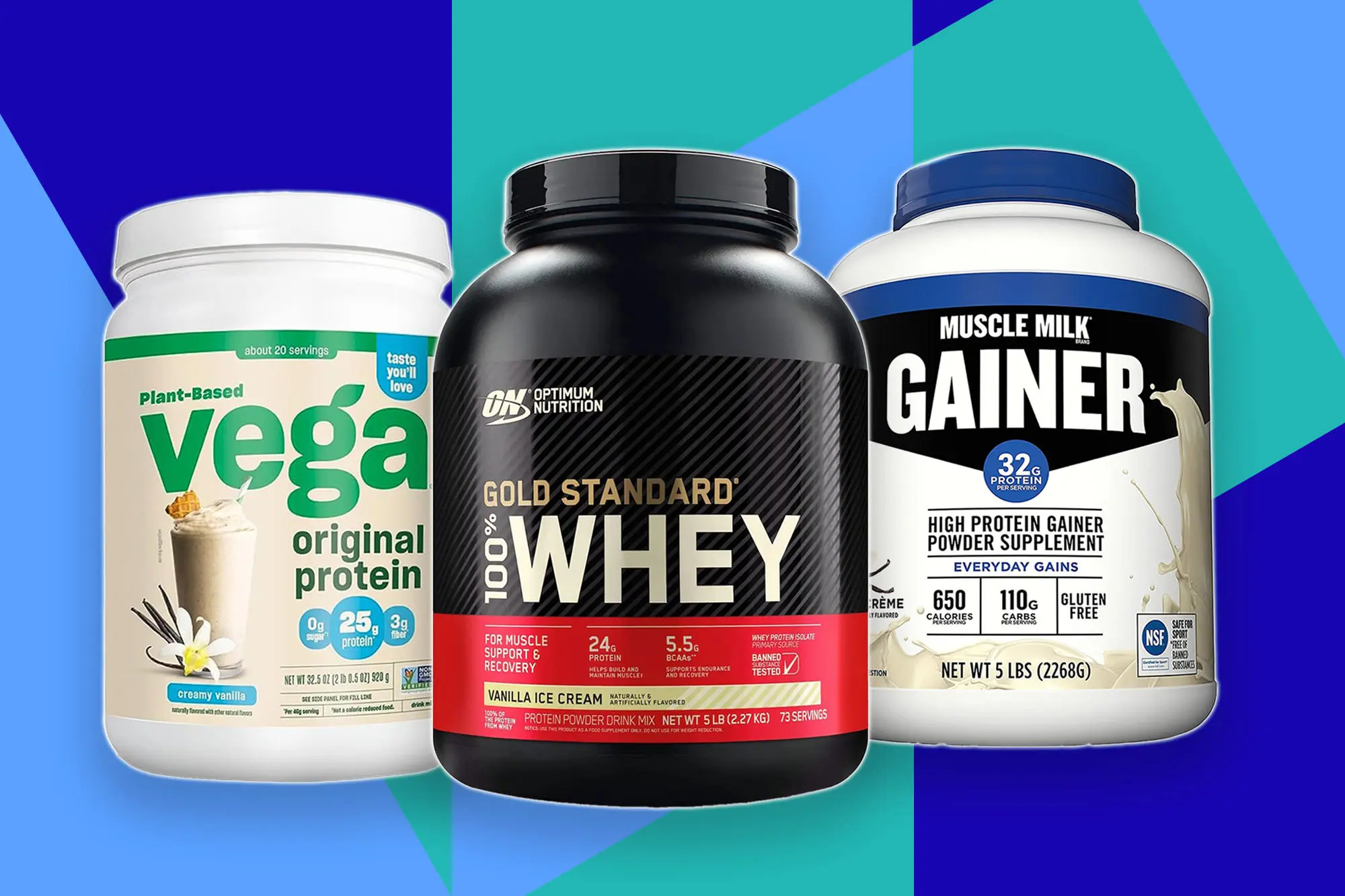Protein powder has become famous for people looking to improve their diet, increase muscle mass, or add more nutrients to their daily routine. With so many options available, it can take time to determine the [best protein powder] for you. But don’t worry—this guide will help you navigate the maze of protein powders to make an informed decision. Whether you’re an athlete, a fitness enthusiast, or someone looking to improve their overall health, there is a protein powder that suits your needs perfectly.
What Is Protein Powder?
Protein powder is a dietary supplement that provides a convenient source of protein to help people meet their daily nutritional needs. It typically comes in a powdered form that can be mixed with water, milk, or other beverages. Protein powder is ideal for those who need extra protein, like athletes, bodybuilders, or people who may not get enough from their regular diet. The [best protein powder] can help with muscle recovery, growth, and overall health.
Types of Protein Powder
With so many different protein powders available, it can be challenging to know which one best suits your needs. Here’s a rundown of the most common types:
- Whey Protein
Whey protein is one of the most popular and widely used protein powders. It’s a complete protein containing all nine essential amino acids. Derived from milk, it’s quickly absorbed by the body, making it ideal for post-workout recovery.
- Pros:
- Quick absorption
- High-quality protein
- Promotes muscle growth
- Cons:
- It contains lactose, which can be problematic for those who are lactose-intolerant
- Casein Protein
Casein is another type of milk-based protein, but unlike whey, it is absorbed more slowly. This slow digestion makes it an excellent option for nighttime consumption, as it can help provide a steady supply of amino acids throughout the night.
- Pros:
- Slow release of amino acids
- Ideal for nighttime use
- Cons:
- Contains lactose
- Not suitable for quick post-workout recovery
- Plant-Based Protein
Plant-based protein powders are derived from various plant sources such as peas, brown rice, soy, and hemp. They are an excellent alternative for vegans, vegetarians, or anyone with lactose intolerance.
- Pros:
- Dairy-free and suitable for vegans
- Often hypoallergenic
- Cons:
- It may have an earthy taste
- Often not a complete protein (may need to be combined with other sources)
- Soy Protein
Soy protein is a complete protein source that is plant-based. It’s rich in amino acids and has been shown to help with muscle growth, making it an excellent choice for vegetarians and vegans.
- Pros:
- Complete protein source
- Suitable for vegetarians and vegans
- Cons:
- It may affect hormone levels in some individuals
- The taste may not be as appealing to everyone
- Egg White Protein
Egg white protein is derived from the whites of eggs and is an excellent source of high-quality protein. It’s fat-free and low in carbohydrates, making it a good option for those watching their calorie intake.
- Pros:
- Complete protein
- Fat-free and low-calorie
- Cons:
- Not suitable for vegans
- It may be more expensive compared to other options
- Collagen Protein
Collagen protein is derived from animal connective tissues and is rich in specific amino acids that support skin, hair, joint, and gut health. It is not a complete protein but can be a great addition to a balanced diet.
- Pros:
- Supports skin, hair, and joint health
- Easy to digest
- Cons:
- Not a complete protein
- Not suitable for vegetarians or vegans
How to Choose the Best Protein Powder for You
Choosing the [best protein powder] depends on your needs, goals, and dietary restrictions. Here’s what you should consider:
- Your Dietary Needs
The first step in choosing the [best protein powder] is determining your dietary needs. Are you lactose intolerant? Are you following a vegan diet? Knowing your specific dietary restrictions will help narrow down your choices.
- Fitness Goals
What are you trying to achieve? Different protein powders can support different goals:
- Muscle Gain: Whey or casein proteins are great muscle-building and recovery options.
- Weight Loss: Look for a low-calorie protein powder with no added sugars or artificial ingredients.
- General Health: Plant-based proteins and collagen are excellent for overall wellness.
- Protein Content
Check the label to see how much protein is provided per serving. The [best protein powder] for muscle building should contain at least 20-30 grams per serving.
- Ingredients List
Always check the ingredients to ensure no artificial additives or fillers. A short, simple ingredients list is often a sign of a high-quality protein powder.
Benefits of Protein Powder
Protein powder offers various benefits for different people, including athletes, gym-goers, and those simply looking to boost their protein intake.
- Muscle Growth and Recovery
Protein is essential for muscle repair and growth. After a workout, your muscles need protein to recover and grow stronger. The [best protein powder] can help speed up this process and support muscle health.
- Weight Management
Protein helps to keep you feeling full longer, which can prevent overeating. Many people use protein powder as a meal replacement or snack to support weight loss goals.
- Convenient Source of Nutrients
Life can get busy, and cooking protein-rich meals can be challenging. Protein powder provides a quick, convenient way to get your body’s nutrients.
- Boosting Metabolism
Protein has a higher thermic effect than fats and carbohydrates, meaning your body uses more energy to digest it. This can help boost your metabolism and contribute to weight management.
How to Use Protein Powder
There are many ways to incorporate protein powder into your diet. Here are some popular methods:
- Shakes and Smoothies: The most common way to use protein powder is by mixing it with water, milk, or your favorite smoothie ingredients.
- Baking: To make a high-protein treat, you can add protein powder to muffins, pancakes, or cookies.
- Oatmeal: Stir a scoop of protein powder into your morning oatmeal for an extra protein boost.
- Yogurt: Mix it into yogurt for a high-protein snack perfect for any time of the day.
Potential Side Effects of Protein Powder
While protein powder can offer many benefits, it’s essential to be aware of potential side effects, especially if you overdo it. Here are some things to keep in mind:
- Digestive Issues: Due to the lactose content, some people may experience bloating, gas, or an upset stomach after consuming certain protein powders, particularly whey or casein.
- Kidney Strain: Consuming too much protein over an extended period can strain the kidneys, especially in people with pre-existing kidney conditions. It’s essential to stick to recommended serving sizes.
- Added Sugars: Some protein powders contain added sugars or artificial sweeteners, which can be unhealthy if consumed excessively. Always check the ingredients list to avoid unwanted additives.
Comparison Table: Types of Protein Powder
Protein TypeSourceComplete ProteinBest ForNot Suitable For
Whey Milk Yes Muscle gain, recovery Lactose intolerant
Casein Milk Yes Nighttime recovery Lactose intolerant
Plant-Based Various plants Sometimes Vegans, general health None
Soy Soybeans Yes Vegans, muscle gain People avoiding soy
Egg White Egg whites Yes Low-calorie, muscle gain Vegans
Collagen Animal tissue No Joint, skin, hair health Vegetarians, vegans
Tips for Finding the Best Protein Powder
Finding the [best protein powder] can feel overwhelming due to the many options available. Here are some tips to help you choose the right one:
- Read Reviews
Customer reviews are a great way to learn about a protein powder’s taste, mixability, and effectiveness. Look for reviews from people with similar goals to understand whether the product will work for you.
- Look for Third-Party Testing
Third-party labs often test the [best protein powder] to ensure quality and safety. Look for certifications from organizations like NSF or Informed-Choice.
- Consider Flavor
While the effectiveness of a protein powder is the most critical factor, taste matters too. The [best protein powder] should taste good, especially if you plan to use it daily. Some popular flavors include chocolate, vanilla, and strawberry.
- Check for Allergens
If you have any allergies, read the label carefully. Many protein powders contain common allergens, such as dairy, soy, or gluten.
Frequently Asked Questions
- How Much Protein Powder Should I Take?
The amount of protein powder you should take depends on your fitness goals and dietary needs. Most people aim for 20-30 grams of protein per serving, usually one scoop. However, it’s essential not to rely entirely on protein powder for protein intake—whole food sources are always preferred.
- Can I Use Protein Powder as a Meal Replacement?
While protein powder can be used as a meal replacement in a pinch, replacing whole meals regularly is not recommended. The [best protein powder] should supplement your diet, not replace the nutrients you get from whole foods.
- When Is the Best Time to Take Protein Powder?
The best time to take protein powder depends on your goals:
- After a Workout: Whey protein is an excellent option for post-workout recovery due to its quick absorption.
- Before Bed: Casein protein is ideal before bed, as it’s slowly digested and provides a steady supply of amino acids throughout the night.
- Between Meals: Protein powder can also be used between meals to keep you full and support your protein intake.
- Are There Any Natural Alternatives to Protein Powder?
Yes, there are natural alternatives to protein powder, such as:
- Eggs
- Greek Yogurt
- Chicken Breast
- Lentils
- Quinoa
These foods are rich in protein and can help you meet your protein needs without using supplements.
Final Thoughts on the Best Protein Powder
Choosing the [best protein powder] can be a game-changer for reaching your fitness and health goals. Whether you’re looking to build muscle, lose weight, or simply add more nutrients to your diet, a protein powder out there is right for you. Remember to consider your dietary needs, fitness goals, and preferences. And don’t forget—while protein powders are convenient, whole-food protein sources should always be a part of your balanced diet.
You can find the [best protein powder] for your needs with the correct information. So try it and see how it can support your journey to better health and fitness!


